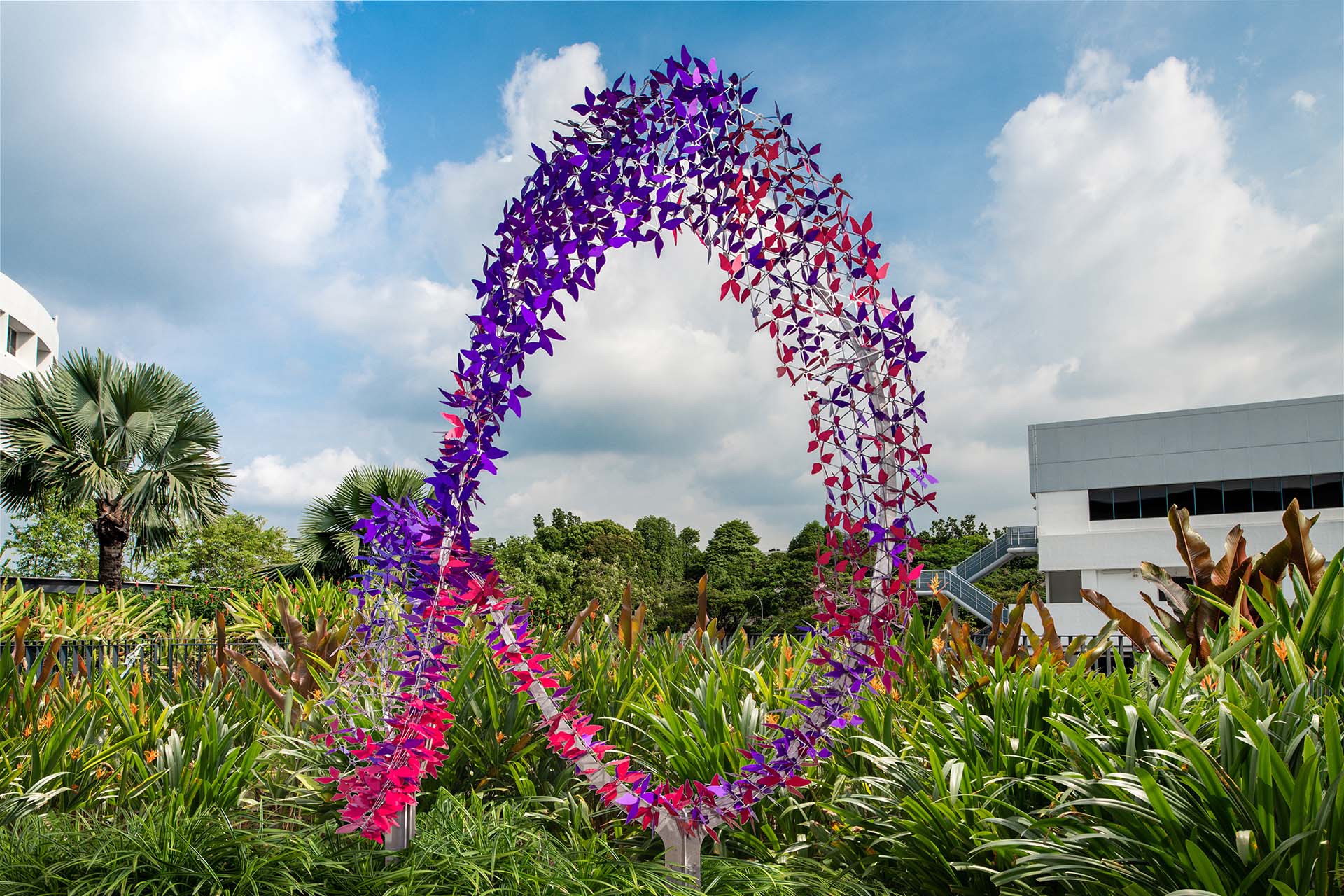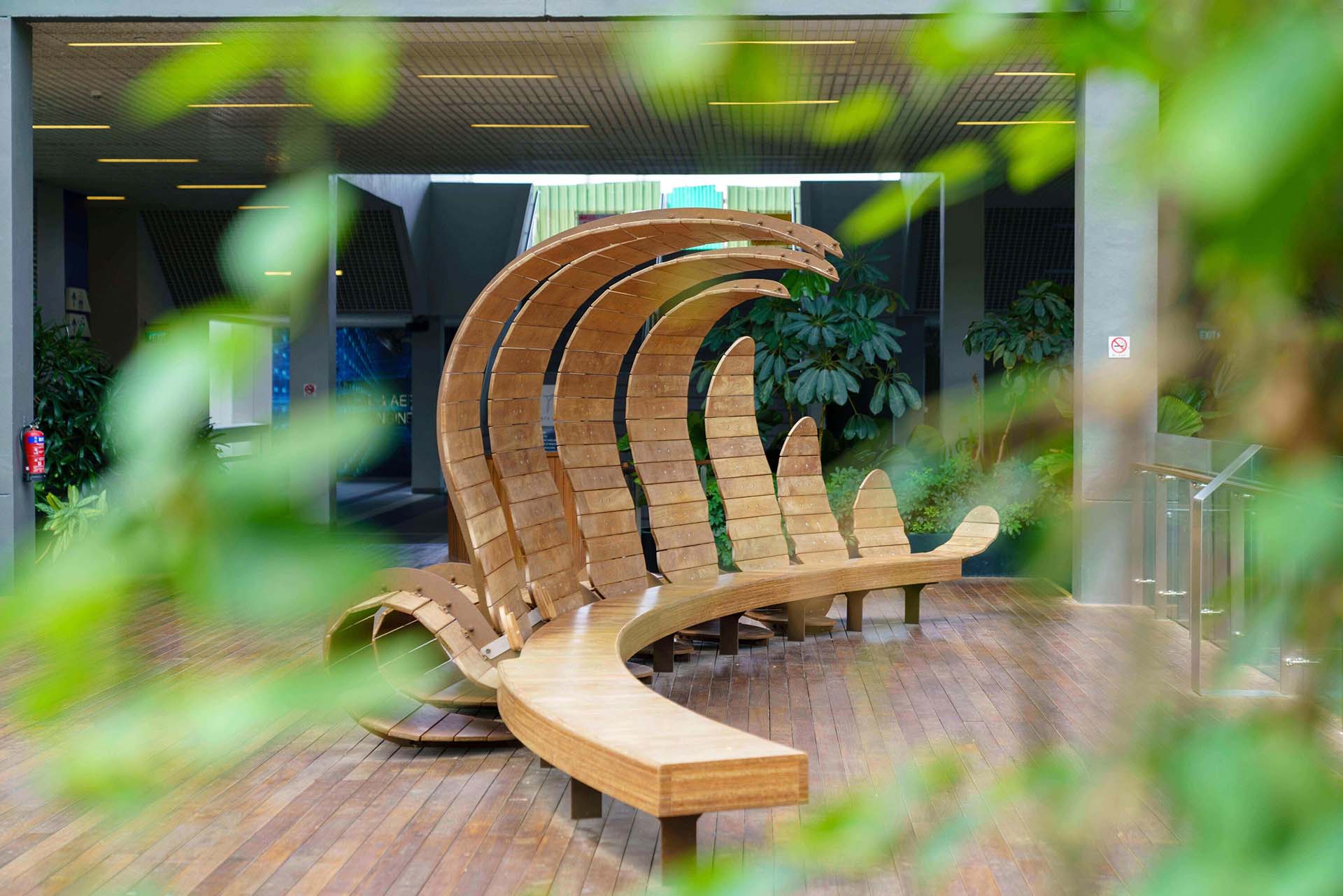The Third Paradise

The Third Paradise (2019)
Michelangelo Pistoletto
Red Sessile Joyweed
H46600 x L20100 mm
The artificial world has provided mankind with comforts, but also led to the deterioration of our natural environment.
The central circle in the symbol, the Third Paradise, represents a world in which there is an ideal balance between human activities and nature, something which is indispensable in order to ensure the survival of mankind.
The Third Paradise or Il Terzo Paradiso by world-renowned Italian artist Michelangelo Pistoletto is a living art installation made of Red Sessile Joyweed plant, an edible local shrub that is also made into herbal tea.
The artwork adorns the curving green roof of the NTU Art, Design and Media (ADM) building, a conceptual artwork that comprises three large connecting circles spanning 41 meters at its longest length. It uses a symbol Pistoletto created that plays on the mathematical infinity sign, with two smaller circles on opposing ends representing nature’s paradise and an artificial paradise.
The Third Paradise was unveiled in 2019 to commemorate the launch of Pistoletto's exhibition 'The Third Paradise - Between Obverse and Reverse' held at Mucciacia Gallery. The permanent installation on the ADM rooftop is one of many works in The Third Paradise series.

Artist
Michelangelo Pistoletto is an Italian artist born in 1933 in Biella. He is renowned for his Mirror Paintings – artworks made of human-sized mirrors that have been displayed in major galleries and museums across Europe and the United States since the 1960s. During the 1990s, Pistoletto brought art into active relation with diverse spheres of society with the aim of inspiring and producing responsible social change, creating the non-profit Cittadellarte – Fondazione Pistoletto among many initiatives, and in 2004, announced the most recent phase of his work The Third Paradise.
Bio adapted from pistoletto.it
Behind the Scenes
The Rebirth/Third Paradise is the fusion between the first and second paradise:
The first is the paradise in which humans were fully integrated into nature.
The second is the artificial paradise, developed by human intelligence to globalising proportions through science and technology. This paradise is made of artificial needs, artificial products, artificial comforts, artificial pleasures, and every other form of artifice.
Humankind has created a truly artificial world which has triggered, in an exponential manner and in parallel with beneficial effects, irreversible processes of decline and consumption of the natural world. The Third Paradise is the third phase of humanity, realise as a balanced connection between artifice and nature.
The Third Paradise is the passage to a new level of planetary civilisations, essential to ensure the survival of the human race. To this purpose we first of all need to re-form the principles and the ethical behaviours guiding our common life. The Third Paradise is the great myth that leads everyone to take personal responsibility in the global vision. The symbol of the Third Paradise, a reconfiguration of the mathematical infinity sign, is made of three consecutive circles. The two external circles represent all the diversities and antinomies, among which nature and artifice, The central one is given by the compenetrating of the opposite circles and represents the generative womb of a new humanity?" (Michelangelo Pistoletto, 2003).
Dr Andrea Nanetti
ADM Associate Chair (Research)

Art blooms on iconic sloping grass roof at NTU Singapore
Media announcement and links to media coverage
Learn moreRelated Artworks
Inspired by nature

Loop
Loop is a 4.5m tall interdisciplinary sculptural installation consisting 1,200 butterflies fluttering on an almost invisible Möbius loop formation.

Volcanic Leaf Suspended
Volcanic Leaf Suspended by Meridel Rubenstein is part of a series of works that look at ecological processes across time that reinforce or destroy the notion of Eden.

Fern
Inspired by the lush greenery of the campus, Fern is a site-specific sculptural bench that provides shelter to busy students and teachers in transit.

